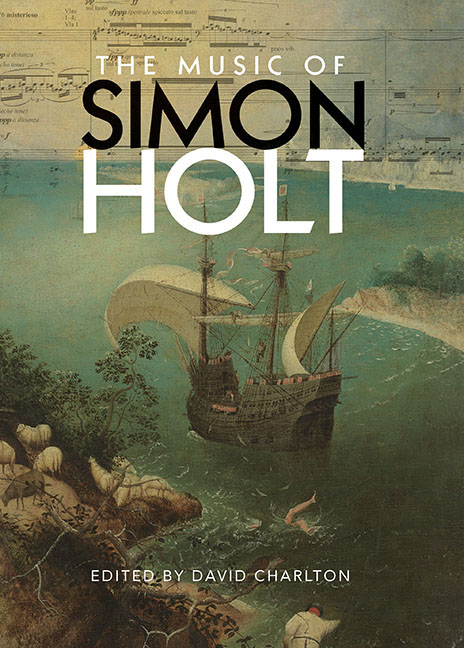Book contents
- Frontmatter
- Contents
- Figures and Tables
- Contributors
- Preface and Acknowledgements
- Abbreviations, with a note on recordings and scores
- Introduction Memories of Magical Moonlight: Simon Holt's years as a composition student
- 1 Duende y Duelos: The Andalusian spirit in the Lorca settings
- 2 An Interplay of Passion and Spirit: The Nightingale's to Blame
- 3 Images in Sound: Movement, harmony and colour in the early music
- 4 Myth and Narrative in 3 for Icarus
- 5 Sound, Sense and Syntax: The Emily Dickinson settings
- 6 Piano Music
- 7 Redefining the Cello's Voice: Musical agency in feet of clay
- 8 Performance and Reflections: Holt's music for oboe and cor anglais
- 9 Shaking the Bars: The Yellow Wallpaper
- 10 Listening to the River's Roar: Stance, texture and space in the concertos
- 11 Orchestral Works in Performance
- 12 Oblique Themes and Still Centres: A conversation between
- 13 Sketching and Idea-Gathering
- 14 Art, Conceptualism and Politics in Holt's music
- Appendix A Overview and Catalogue of Pieces
- Appendix B Texts by Simon Holt for Raju Raghuvanshi is a ghost and The Legend of Melusine
- Bibliography
- Index of pieces by Simon Holt
- General index
1 - Duende y Duelos: The Andalusian spirit in the Lorca settings
Published online by Cambridge University Press: 01 September 2018
- Frontmatter
- Contents
- Figures and Tables
- Contributors
- Preface and Acknowledgements
- Abbreviations, with a note on recordings and scores
- Introduction Memories of Magical Moonlight: Simon Holt's years as a composition student
- 1 Duende y Duelos: The Andalusian spirit in the Lorca settings
- 2 An Interplay of Passion and Spirit: The Nightingale's to Blame
- 3 Images in Sound: Movement, harmony and colour in the early music
- 4 Myth and Narrative in 3 for Icarus
- 5 Sound, Sense and Syntax: The Emily Dickinson settings
- 6 Piano Music
- 7 Redefining the Cello's Voice: Musical agency in feet of clay
- 8 Performance and Reflections: Holt's music for oboe and cor anglais
- 9 Shaking the Bars: The Yellow Wallpaper
- 10 Listening to the River's Roar: Stance, texture and space in the concertos
- 11 Orchestral Works in Performance
- 12 Oblique Themes and Still Centres: A conversation between
- 13 Sketching and Idea-Gathering
- 14 Art, Conceptualism and Politics in Holt's music
- Appendix A Overview and Catalogue of Pieces
- Appendix B Texts by Simon Holt for Raju Raghuvanshi is a ghost and The Legend of Melusine
- Bibliography
- Index of pieces by Simon Holt
- General index
Summary
THE IBERIAN PENINSULA, from the decline of the Roman imperial dominance until at least the end of the Inquisition period, had been a land of political and religious conflict, of oppression and at times suppression, aggravated on occasion by outbreaks of bubonic plague, smallpox and typhus. One can only imagine what it must have been like for the powerless ordinary people living during those centuries of unavoidable confusion and uncertainty – of fear even. No ethnic or religious group felt entirely comfortable living or working alongside the others, despite the fact that in the eleventh and twelfth centuries, the Jews, in some cases, were allowed to lead Islamic forces and even become members of regional governments, while the Gitanos were keeping themselves deliberately apart, mostly mobile, and safe.
In spite of all this confusion and suppressed conflict, the Jewish and Arab societies were, at the time, the most sophisticated and learned in Europe – an important legacy for us being the Arabic numerals, which almost certainly entered into European culture via the Iberian peninsula. In its southern region during that period, much fine poetry was written: by Arabs in Arabic, which at that time was the most expressive language in common use in Spain, and by Jews – also in Arabic or a little later in modified biblical Hebrew and Ladino, the form of Spanish adopted and adapted by the Jews for broader communication. Already in this poetry we find elements of duende, the spiritual awareness of the proximity of death or the inevitability of fate. That word, as mentioned in my Introduction, has many meanings, from ‘goblin’ to ‘spiritual collapse’, but chiefly refers to a particular type of creative spirit. In a lecture Lorca gave on the subject in Havana in 1930, and in Buenos Aires and Montevideo in 1933, he offered the following clues as to its nature, which I have paraphrased as:
‘Duende is a force, not just a way of doing things; a struggle, not merely an abstract idea.’
‘It has dark sounds.’
‘An earth-spirit.’
‘All art-forms can possess it, but it is at its best in dance, music, and poetry when spoken, because these require a living interpreter.’
- Type
- Chapter
- Information
- The Music of Simon Holt , pp. 5 - 39Publisher: Boydell & BrewerPrint publication year: 2017

